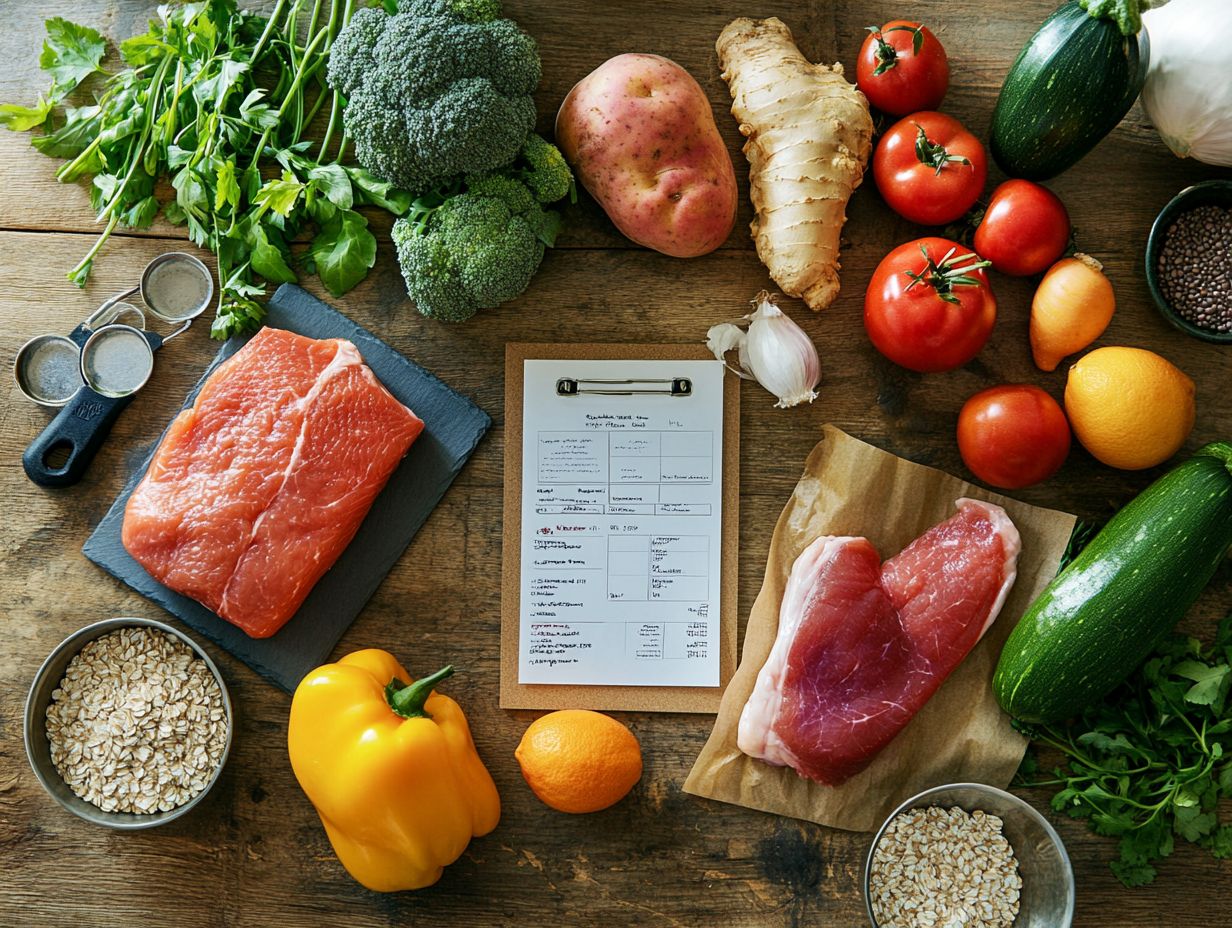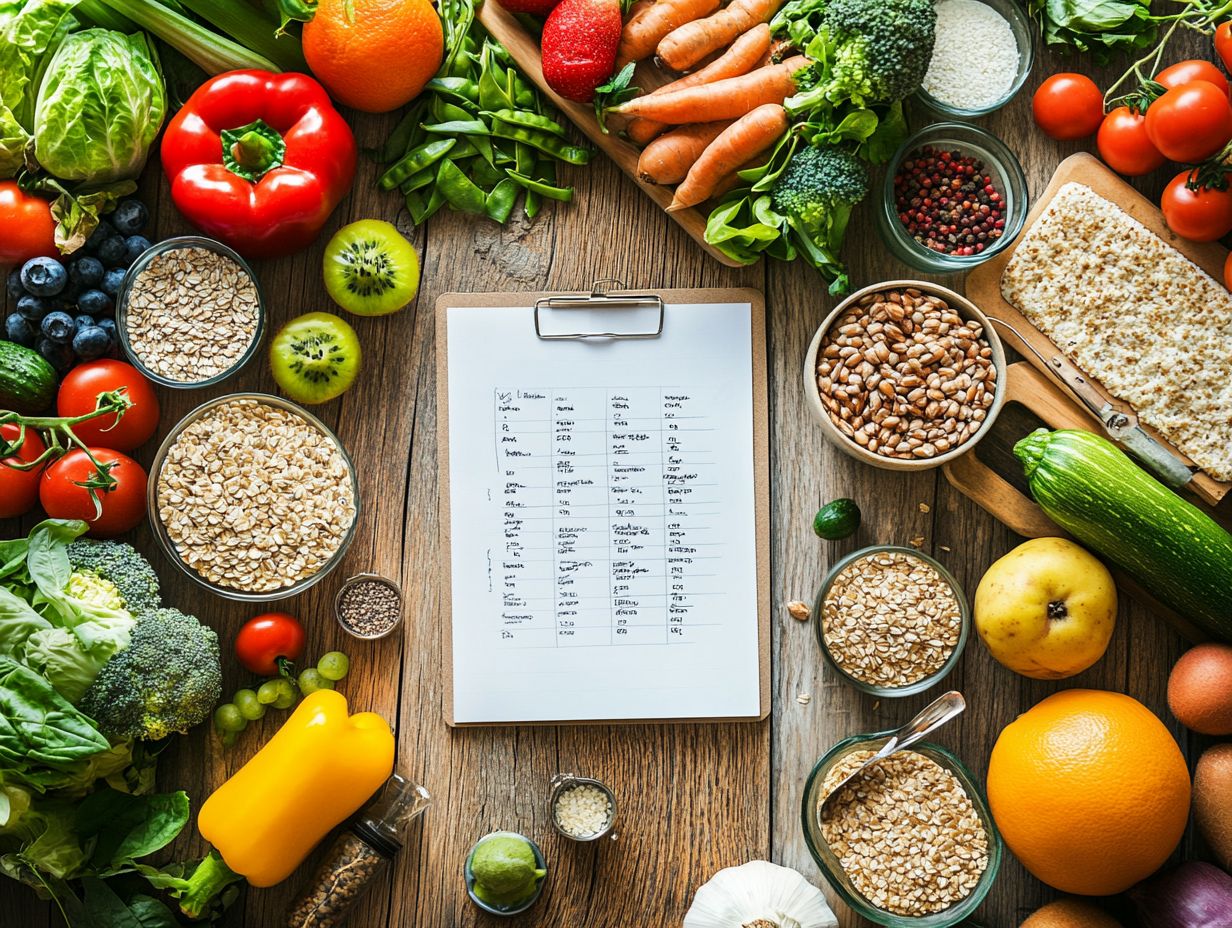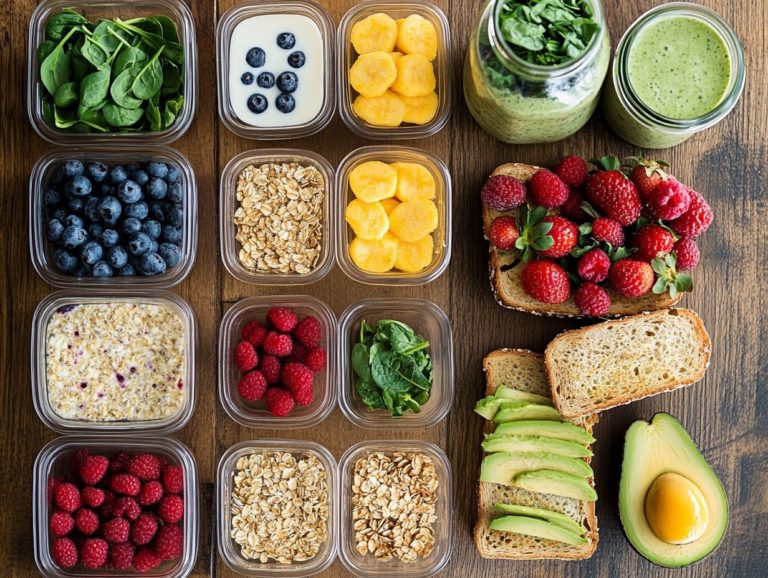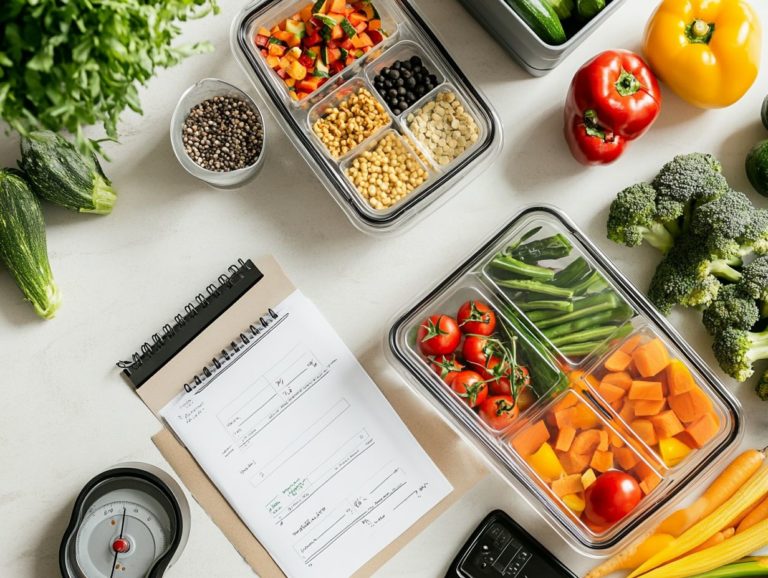The Science Behind Meal Planning for Nutrition
Meal planning transcends mere trendiness; it is an essential strategy for achieving optimal nutrition and elevating your overall health.
By thoughtfully organizing your meals, you can align more closely with your dietary goals while simultaneously saving both time and money.
This article delves into the science of meal planning, examining crucial factors such as your nutritional needs and budget constraints. It also offers practical tips for crafting balanced meal plans.
From accommodating specific dietary preferences to implementing efficient meal prep techniques, get ready to transform your life with this exciting guide to meal planning!
Discover how a touch of organization can revolutionize your relationship with food!
Contents
- Key Takeaways:
- The Importance of Meal Planning for Nutrition
- Key Factors to Consider in Meal Planning
- Creating a Balanced and Nutritious Meal Plan
- Meal Planning for Specific Dietary Needs
- Frequently Asked Questions
- What is the science behind meal planning for nutrition?
- Why is meal planning important for our nutrition?
- How does meal planning help us achieve a healthy diet?
- What should I keep in mind for effective meal planning?
- How can meal planning benefit our physical and mental health?
- Are there any specific dietary guidelines to follow when meal planning for nutrition?
Key Takeaways:

Meal planning is crucial for maintaining a healthy diet and improving overall health. Start thinking about your nutritional needs and goals today! Consider your budget and time constraints when creating a meal plan. A balanced and nutritious meal plan should include a variety of food groups and incorporate meal prep and storage techniques.
The Importance of Meal Planning for Nutrition
Meal planning is an essential practice that not only promotes healthy eating but also provides a systematic method for achieving healthy eating and weight management.
By organizing your meals in advance, you can streamline your grocery trips, reduce food waste, and hone essential cooking skills tailored to your personal tastes.
The significance of meal prep goes beyond convenience; it enables you and your family to craft nutritious home-cooked meals that are both budget-friendly and environmentally sustainable, particularly in today s fast-paced world.
How Meal Planning Affects Diet and Health
Meal planning plays a pivotal role in shaping your diet and health by encouraging you to incorporate nutrient-rich foods. This ultimately promotes healthier eating habits and supports your weight loss journey.
By thoughtfully selecting high-quality ingredients, you enable yourself to make informed choices that directly impact your overall well-being. This proactive strategy not only helps you steer clear of impulsive eating decisions but also aids in eliminating processed foods laden with sugars and unhealthy fats.
As you engage in regular meal prep, you develop a heightened awareness of portion sizes and healthy eating, laying a sustainable foundation for lasting lifestyle changes.
Embracing this practice can lead to improved energy levels, enhanced mood stability, and a stronger immune system, all contributing to significant long-term health benefits.
Key Factors to Consider in Meal Planning
When you embark on meal planning, it’s vital to take into account several factors, including your nutritional needs.
Also consider your budget constraints and time management skills. Each of these elements plays a significant role in ensuring your meal prep day is not only successful but also enjoyable.
Nutritional Needs and Goals

Understanding your nutritional needs and goals is a crucial first step in effective meal planning. This ensures that the meals you prepare truly align with your healthy eating objectives and weight management efforts.
By considering factors such as your age, gender, activity level, and any specific health concerns, you can gain clarity on your dietary requirements.
Setting realistic and achievable goals is essential. Instead of aiming for drastic weight loss, focusing on small, sustainable changes can lead to lasting results.
Incorporating a diverse array of healthy recipes, tailored to meet your nutritional needs, not only makes meal preparation a delight but also enhances your overall satisfaction.
Picture this: a balanced meal featuring grilled salmon, packed with omega-3 fatty acids, accompanied by quinoa and steamed broccoli a vibrant plate that checks off both nutritional and flavor boxes.
Join the meal planning revolution today and reclaim your health!
Budget and Time Constraints
Balancing budget and time constraints is essential in your meal planning journey. It enables you to maximize efficiency and savings during grocery store trips while ensuring that meals are prepared without undue stress.
To achieve this, consider creating a weekly menu that highlights seasonal ingredients and uses pantry staples. This can help you reduce unnecessary spending.
Prioritizing simple recipes that can be made in batches saves you time and minimizes food waste, ensuring that everything you purchase is utilized effectively.
Employing a shopping list based on your planned meals can help keep impulse buys at bay. This makes your grocery trips more streamlined and efficient.
By incorporating these strategies, you can skillfully navigate the delicate balance between managing your finances and maintaining a nutritious diet, all without feeling overwhelmed.
Creating a Balanced and Nutritious Meal Plan
Crafting a balanced and nutritious meal plan requires you to thoughtfully integrate a diverse array of food groups. Each meal should play its part in promoting a well-rounded diet that not only supports healthy eating habits but also streamlines your meal prep process.
Incorporating Different Food Groups
Incorporating a variety of food groups into your meal planning is crucial for achieving a balanced diet. Think of proteins, grains, vegetables, and fruits as the pillars of your nutritional intake, ensuring you receive all the necessary nutrients.
Each of these groups brings its own unique benefits to the table, contributing to your overall health and wellness.
- Proteins found in sources like legumes, lean meats, and fish are important for muscle health and immunity.
- Whole grains, such as quinoa, brown rice, and oats, deliver sustained energy and vital fiber for digestive health.
- Vegetables, including leafy greens, bell peppers, and broccoli, are brimming with vitamins and antioxidants, which help reduce inflammation.
- Fruits like berries, apples, and citrus not only satisfy that sweet tooth but also come packed with essential vitamins, minerals, and hydration.
By carefully selecting from each food group, you can craft meals that not only nourish your body but also promote long-term health.
Meal Prep and Storage Tips

Effective meal prep and storage tips are essential for maintaining meal consistency and ensuring the longevity of your prepared food. Utilizing meal containers and proper food storage techniques is key.
By adopting a strategic approach, you can streamline your cooking routine and minimize food waste. This allows you to enjoy nutritious meals throughout the week.
The choice of meal containers is crucial; selecting airtight, free from harmful chemicals options can significantly extend the freshness of your food items.
Managing leftovers effectively is another key aspect labeling containers with dates and contents ensures that nothing goes to waste. Incorporate a variety of container sizes to store different meal portions. This makes it easier to mix and match ingredients while keeping everything organized and accessible.
Start meal prepping today to enjoy healthy, delicious meals all week long!
Meal Planning for Specific Dietary Needs
Meal planning tailored to specific dietary needs is crucial, especially if you have restrictions like vegetarian, vegan, gluten-free, or allergen-free diets.
This approach ensures your meals are not only satisfying but also bursting with the nutrition you crave. Start planning today for a healthier tomorrow!
Vegetarian and Vegan Options
Incorporating vegetarian and vegan options into your meal planning can truly elevate your dining experience. Explore vibrant quinoa salads and hearty lentil soups. These dishes aren t just good for you; they re a feast for your taste buds!
To achieve this, explore diverse meal ideas such as savory chickpea stir-fries. These dishes not only delight your palate but also deliver essential nutrients.
Utilizing ingredients like tofu, tempeh, and black beans can significantly enhance your protein intake, while a colorful array of vegetables guarantees you re receiving ample vitamins and minerals.
Don’t overlook healthy fats think avocados and nuts as well as whole grains to create well-rounded meals. By thoughtfully combining these elements, you can effortlessly maintain a balanced, nutritious diet that is both satisfying and nourishing.
Gluten-Free and Allergen-Free Meal Planning
Gluten-free and allergen-free meal planning requires a thoughtful selection of ingredients. This approach helps maintain healthy eating while respecting your unique food preferences and restrictions.
Understanding food labels is crucial, as they can often be misleading. Focusing on whole foods like fresh fruits, vibrant vegetables, lean proteins, and gluten-free grains can establish a solid foundation for nutritious meals.
Don t underestimate the power of herbs and spices; they can significantly elevate flavors without introducing common allergens.
Meal prepping is another smart strategy. It not only saves you time but helps you avoid last-minute decisions that could lead to less-than-ideal choices.
By planning balanced dishes and keeping a variety of safe options at your fingertips, you can create satisfying meals that cater to both your health needs and taste preferences.
Frequently Asked Questions

What is the science behind meal planning for nutrition?
It s about knowing how different foods affect our bodies. This helps us create balanced meals.
Why is meal planning important for our nutrition?
Meal planning helps us control what we eat. It ensures we get the nutrients our bodies need.
How does meal planning help us achieve a healthy diet?
Meal planning ensures we consume a variety of foods from different groups. It also helps us balance our meals with the right mix of carbs, proteins, and fats, along with vitamins and minerals.
What should I keep in mind for effective meal planning?
Key principles include variety, balance, moderation, and nutrient density. Choose a diverse range of foods, balance macronutrients, practice portion control, and prioritize nutrient-dense options.
How can meal planning benefit our physical and mental health?
Meal planning helps maintain a healthy weight, improves energy levels, boosts immunity, and reduces chronic disease risk. Planning meals reduces stress and saves time, which promotes mental well-being.
Are there any specific dietary guidelines to follow when meal planning for nutrition?
Yes, guidelines vary based on age, gender, health conditions, and preferences. Consult a registered dietitian or healthcare professional for personalized advice on creating a healthy meal plan.
Start planning your meals today for a healthier tomorrow!






